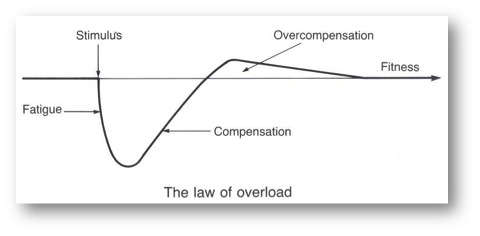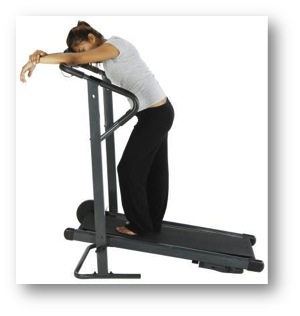
How Much is ENOUGH: Ideal Exercise Frequency
June 24, 2012 // Fitness
There are 168 hours in a week. Between the necessities of life (sleeping, eating, working) and our practiced rituals (TV, computer, phone, etc.), our weekly habits leave only a few hours for any additional activities. Exercise, unfortunately, is often scheduled in last in our weekly routine. In fact, the most common excuse as to why people do not exercise is TIME. How much time do we really need to stay fit? How much is time is required to change our bodies?
In order to determine the ideal exercise frequency for the general population, we must first understand the Theory of Overcompensation. The Theory of Overcompensation explains why exercise has a positive effect on the body after rest and recovery. The theory begins when a stimulus (resistance training) causes the body to fatigue and breakdown (exercising). As the body recovers from the physical stress (compensation), it not only meets, but also exceeds the original stress placed upon it (overcompensation). When we are able to maintain a regular exercise frequency, the body is placed on a streamline of fitness progress as it adapts and overcompensates to regular amounts of stimuli.
Theory of Overcompensation

In order to regularly induce positive adaptations within the body, we must put the body through physical stress that is comparable, if not more intense, than the previous stress (workout). This is why progression is necessary to increase fitness levels and make physical changes to the body. If our bodies are not adapting to the resistance demands, this is an indication that the rest period (compensation) between workouts is not adequate.
Understanding the amount of rest time needed is one of the most important components to a successful resistance-training program. The general recovery time for a muscle group to repair itself back to a working state is 24-48 hours. The general recovery time for the nervous system to re-establish equilibrium is 48-72 hours. This means that within a 3-day period, our bodies have repaired themselves to their original state and have begun making physiological changes to adapt to the stress it has experienced.

Rest is just as important as Exercise.
Following the Theory of Overcompensation, we can begin to compare our rest periods against our weekly fitness routines. Below are sample weekly exercise schedules of the typical resistance-training client.
Sample A
(Total Body Resistance Training 2x a week; 1 day of Cardio)
| Day | Activity | Physical Reaction |
| Monday | Resistance-Training (60 minutes) | Physical Stress (Stimulus Occurs); Body begins compensating. |
| Tuesday | Resistance-Training (60 minutes | Physical Stress (Stimulus Occurs); Body begins compensating. |
| Wednesday | OFF | No Stress; Body begins overcompensating to adapt to previous stress. |
| Thursday | OFF | No stress; No adaptation. Body returns to state of equilibrium. |
| Friday | OFF | No stress; No adaptation. |
| Saturday | Light Cardiovascular Exercise (30-40 minutes, continuous pace) | Light Physical Stress (No stimulation occurs). Body recovers quickly. No adaptation required. |
| Sunday | OFF | No stress; No adaptation. |
Sample B
(Total Body Resistance Training 2x a week; 1 day of Cardio)
| Day | Activity | Physical Reaction |
| Monday | OFF | No stress; No adaptation. |
| Tuesday | Resistance-Training (60 minutes) | Physical Stress (Stimulus Occurs); Body begins compensating. |
| Wednesday | OFF | No Stress; Body begins overcompensating to adapt to previous stress. |
| Thursday | Resistance-Training (60 minutes) | Physical Stress (Stimulus Occurs); Body begins compensating. |
| Friday | OFF | No Stress; Body begins overcompensating to adapt to previous stress. |
| Saturday | Cardiovascular Training (20 minutes, Varied Resistances) | Physical Stress (Stimulation occurs). Body recovers compensating. |
| Sunday | OFF | No Stress; Body begins overcompensating to adapt to previous stress. |
Sample C
(Total Body Resistance Training 4x a week; 1 day of Cardio)
| Day | Activity | Physical Reaction |
| Monday | Resistance-Training (60 minutes) | Physical Stress (Stimulus Occurs); Body begins compensating. |
| Tuesday | Resistance-Training (60 minutes) | Physical Stress (Stimulus Occurs); Body begins compensating. |
| Wednesday | OFF | No Stress; Body begins overcompensating to adapt to previous stress. |
| Thursday | Resistance-Training (60 minutes) | Physical Stress (Stimulus Occurs); Body begins compensating. |
| Friday | Resistance-Training (60 minutes) | Physical Stress (Stimulus Occurs); Body begins compensating. |
| Saturday | Cardiovascular Training (20 minutes, Varied Resistances) | Physical Stress (Stimulation occurs). Body recovers compensating. |
| Sunday | OFF | No Stress; Body begins overcompensating to adapt to previous stress. |
We can learn a lot from these three samples. Sample A and Sample B both exercise the same amount during the week, but because of the differences in frequencies, Sample B may experience more body adaptations (changes/transformations) due to a quicker recovery. Sample C is an ideal frequency, as it will be the most effective pace for body adaptations. As soon as the body gets rest, it is stressed again as it is at the height of its overcompensation. This is the ideal exercise frequency, though it may not be possible for everyone. If a person can make the time available, one extra hour of training can significantly increase the effectiveness of their exercise program.
We can also notice that in all three samples, rest is required. Too little rest and the body cannot fully recover. Too much rest will not stress the body enough to regularly adapt. Because everyone responds and adapts differently to exercise, the amount of rest needed will vary from person to person. But remember, the body needs rest to recover and “overcompensate” to a stronger level. Monitoring the frequency of one’s exercising and comparing it to the effectiveness of their weekly routine will help determine if more or less rest time is needed.

Results are not a waiting game.
If progress in training seems stalled and results are stagnant, measuring one’s rest times against its frequency will highlight inconsistencies. A smart exerciser will consider the amount of stress placed on the body and determine the amount of rest needed to overcompensate. Exercise is just a series of equations. Try changing other variables to yield new results. Work out smarter rather than harder.